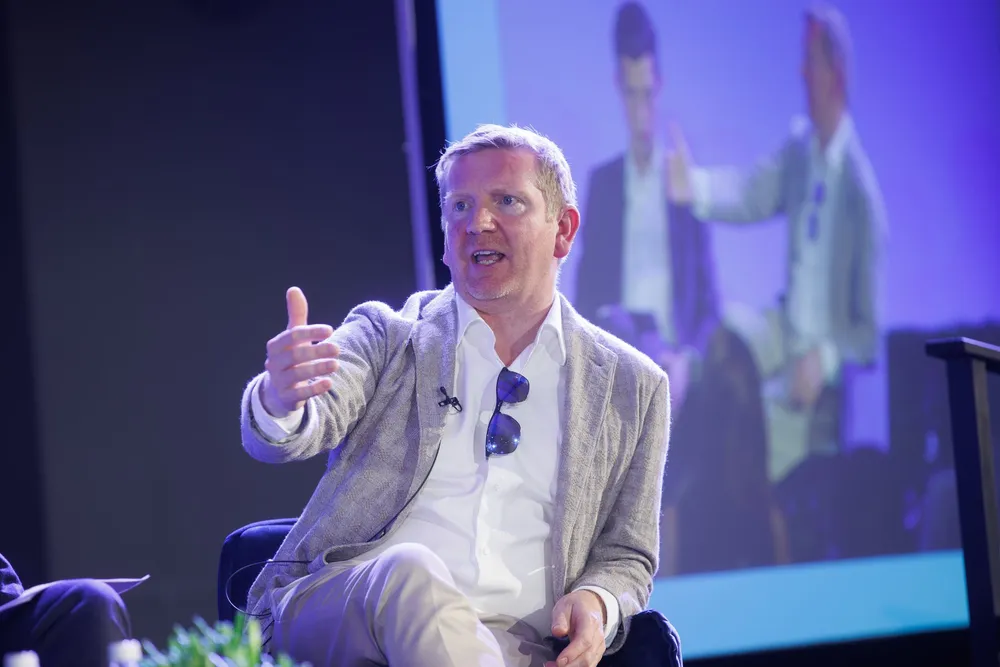GB Energy CEO: Failure to back floating wind now risks painful consequences
Head of new UK state-owned developer tells Recharge it can take long-term, activist approach to help floating wind, even if others are turning away from sector

Failure to back floating offshore wind now could have painful consequences in the future, warns GB Energy chief executive Dan McGrail, as he expands on the new state-backed clean power champion’s strategy for boosting the struggling sector.
McGrail said it is heartening that there is a “huge amount of appetite” in the market for GB Energy and that his team – albeit a small and emerging one – is already discussing project opportunities with a “whole range of investors.”
“We're trying to run as fast as we can at the market,” he said, while at the same time recognising that GB Energy still needs to build itself up as an “organisation, a culture and a team.”
How big can GB Energy, which recently saw £2.5bn ($3.4bn) of its initially planned £8.3bn budget for this Parliament siphoned off to a state-owned nuclear entity, become in the future?
That depends on how you interpret the question, said McGrail. “For me, the measure is impact rather than the size and the dimensions of the company.”
McGrail hopes that GB Energy can make an outsized impact in influencing the development of technologies where there is still a “degree of nascency” – citing floating wind and long duration energy storage as examples.
But for now, McGrail said he sees “more of a need for patient capital and for an activist investor in the floating space.”
‘Crucial we make clear what we’re prioritising’
“I think it’s really important that we send signals to the market that says, ‘Look, these are the three or four areas that we're really prioritising.”
“It doesn't mean that other things are off the table,” he said. “But it's my belief if you look at Orsted, they shape their business around offshore wind. Vattenfall built up as a hydro company. EDF built up as a nuclear company.”
GB Energy probably won’t do one thing, he said, but it does need to “build core competence around certain areas.”
When it comes to floating wind investment, McGrail said that the “initial focus” will be working with projects already in development. “We see our key differentiator is that we're coming in as a developer and sharing development risk with the view in the long run to becoming an owner and operator.”
GB Energy is interested in investing in projects “right the way through the development pipeline,” said McGrail, emphasising that it is “keen to move quickly”.
UK risks ‘running out of projects’ unless it stimulates floating wind
McGrail said he is not unduly worried by the recent retreat of some players from floating, however. “Perspective is interesting here,” he said. “If you look back at the journey of fixed-bottom, you saw companies come in at the start and then exit and then come back in later on.”
Macroeconomic conditions have changed “fairly substantially” in the first half of this decade from the “relatively economically benign conditions” during the 2010s, he said.
“It's inevitable that the risk appetite of some companies change. And that's fine. But I anticipate that they will change again.”
As the head of a publicly owned, activist investor, McGrail said that what he stays focused on is that the “fundamental point does not change: we need to decarbonise and we need an abundance of energy in a world which is going to use a lot more AI.”
That doesn’t mean that GB Energy can be “naïve” to economic conditions, he said. “We need to be mindful” and ensure a “return for the taxpayer” on what it invests.
But its “fundamental view of the destination” should also be guided by other aspects of public policy, he said.
The UK has a legally binding carbon budget, noted McGrail. “And in any given year, in any given set of macroeconomic conditions, people will make different judgments. But our long termism has to be the thing that differentiates [GB Energy].”
Part of that long-termism comes in investing in floating wind while the going is tough in the sector.
Unless “seeding actions” are taken now to stimulate that deeper water pipeline, McGrail said “we could end up paying more in the future,” or the country could end up “being in a situation where there aren't enough projects.”
GB Energy can therefore play a crucial role of stimulating that pipeline and taking a “long-term view,” which he continued will have wider societal benefits, including lower power prices, more jobs and faster deployment.
Renewables ‘resilient’ despite attacks
Renewables are coming under increasing attack from right-wing populist politicians, many of which are aping the rhetoric of US President Donald Trump.
Does that put additional pressure and scrutiny on a new publicly-owned clean power champion?
“I suppose in some ways,” said McGrail, but he added that the renewables industry has had to confront challenges throughout its development and is “pretty resilient.”
Part of that resiliency is having a “mindset” that the industry is “going to prove [its detractors] wrong.”
McGrail recalled when the fixed-bottom industry was starting out, with costs at £160/MWh, people argued it would “never get down to cost parity.”
Back in 2010, when McGrail was at Siemens Wind before its merger with Spain’s Gamesa, he said they “had a waterfall chart that said, ‘This is how we're going to do it. We're going to engineer our way down to €0.04/kWh.’”
“That was the plan. And the strategy was called ‘beat coal.’ We were quite clear about how we're going to do this. And we did it.”
Energy investors might shift capital and strategies, but overall McGrail said the world has invested trillions of dollars on renewables. “That's mostly private capital. And that private capital is looking for long term predictable returns. That's what clean energy provides."
(Copyright)